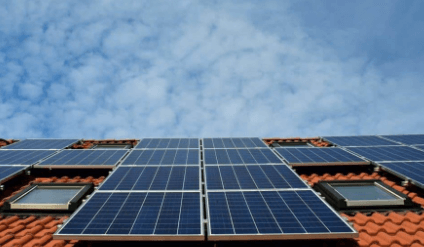Cost of Solar Battery: 5 Things to Know About Solar in Kansas City, MO

You’ve probably heard that the price of solar panels might keep falling for the next ten years. This means right now is a fantastic time to get solar because the prices are so low.
But you might be wondering if solar power is the right choice for your Kansas home. Some people aren’t sure if they have the roof space or the budget. Still, you could gain some significant perks, such as savings and contributing to a healthier planet.
If you’re curious about the cost of solar battery and other important things to know about solar in Kansas City, keep reading! We have five big points that will help you understand more about going solar.
Cost of Solar Battery
Knowing the cost of solar battery is crucial when you decide to power up your home with sunlight. You’ll be looking at a price tag of $6,000-$25,000 for a complete system.
Paying off your solar setup doesn’t have to be a solo journey. Tax incentives and rebates are here to give you a much-needed boost. A whopping 30% federal tax credit can trim your costs.
However, these incentives won’t last forever. Your credit will reduce to 26% and then to 22% in the coming years.
In Kansas City, if you’re a Missouri resident, Evergy’s rebate is a nice back-pocket savings to count on. Unfortunately, Kansas dwellers don’t get the same rebate luxury. But don’t let this dishearten you; your savings over the years can still be huge.
Potential Savings
Your outlay for solar installation can range in the tens of thousands. Yet these costs are mitigated over time by a drastic reduction in your monthly energy bills. After switching to solar, many homeowners notice their electricity costs plummet.
With ever-climbing utility rates, the amount saved only gets larger as time passes. Additionally, increased home values and tax incentives sweeten the deal. Solar isn’t just an eco-friendly choice, but a sound financial one as well.
An exciting aspect of solar energy is the ability to store excess power for later use. This magic happens through solar batteries. They capture and hold the surplus electricity generated during sunny hours.
When the sun sets or during cloudy days when your panels aren’t producing as much electricity, you can tap into this stored energy instead of drawing from the grid. This ensures a steady supply of power and further reduces dependency on utility companies, making your energy costs even lower.
The integration of solar batteries means you’re stepping towards complete energy independence. This self-sufficiency is valuable during power outages or in areas with higher electricity rates.
Choosing the Right Size for Your Home
When opting for home solar, think of your house as a mini power station. You don’t want a system so big that it makes too much energy, nor one so small that it can’t keep up.
Look back at your energy bills from the past few years; this will help you gauge what you need. And remember, an expert solar panel installation team can help tailor the perfect system for your home, ensuring no energy or money gets wasted.
Types of Solar Panels
Monocrystalline and polycrystalline solar panels are the most common. This guide aims to help you make a well-informed decision for your Kansas home.
Monocrystalline Solar Panels
Monocrystalline panels lead the market with their superior efficiency and refined look. Crafted from high-grade silicon, they excel at converting Kansas’s ample sunlight into electricity more effectively than alternative options. Their compact nature makes them appealing for homes with limited roof space.
However, the advantages of monocrystalline panels come at a higher initial cost. Also, their intricate production process involves significant silicon waste. While their performance may decrease during cold Kansas winters, it generally doesn’t significantly impact their effectiveness.
Polycrystalline Solar Panels
As a more economical alternative, polycrystalline panels lag in efficiency due to their lower silicon purity. This efficiency deficit means you might need additional roof space to match the power output of monocrystalline panels.
Despite this, the affordability of polycrystalline panels makes them an attractive option for Kansas homeowners with ample installation space. And while some may not favor their blueish tint, it doesn’t detract from their performance.
Solar Solutions Beyond Panels
Solar shingles and tiles blend the look of conventional roofing materials with the power-harnessing capabilities of photovoltaic (PV) cells. Unlike standard bulky panels, these solar solutions integrate smoothly onto your roof.
They’re great for new buildings or homeowners considering a roof replacement, as they protect and power homes. While their upfront cost is higher than regular panels, solar shingles provide an enhanced visual appeal. They may also be compatible with stringent homeowner association (HOA) appearance regulations.
Solar Windows
These innovative windows use transparent PV glass panels to harness solar energy without obstructing natural light or views. Solar windows are a promising option for high-rise urban buildings with limited roof space. By transforming exterior glass surfaces into energy capture points, buildings can significantly boost their solar capability.
Portable Solar Generators
Portable solar generators are an accessible alternative for those needing backup solar power solutions. These small units capture energy from the sun during the day and supply power to devices and appliances when required. Portable solar generators operate without noise or emissions.
Community Solar Gardens
Community solar gardens bring a cooperative concept to solar power. Several users reap benefits from one shared solar array. By investing in or subscribing to a community solar project, users can enjoy solar power benefits without needing a personal panel installation.
Solar Energy in Kansas City
Switching to solar energy in Kansas City involves navigating a complex landscape of costs, incentives, and logistical challenges. Whether you’re hashing out the cost of solar battery, calculating potential savings, or pondering the size of your solar array, the decision to go solar is significant.
Before diving into the world of solar solutions, consider the unique aspects of your home and explore all ways to save energy. Our lifestyle articles can suggest more ways you can save energy at home and become more eco-friendly overall. Explore our tips to help Mother Nature.




